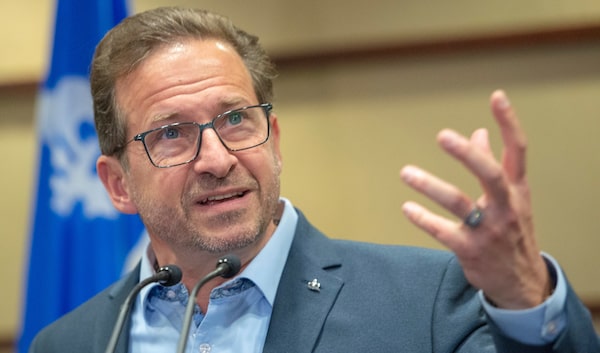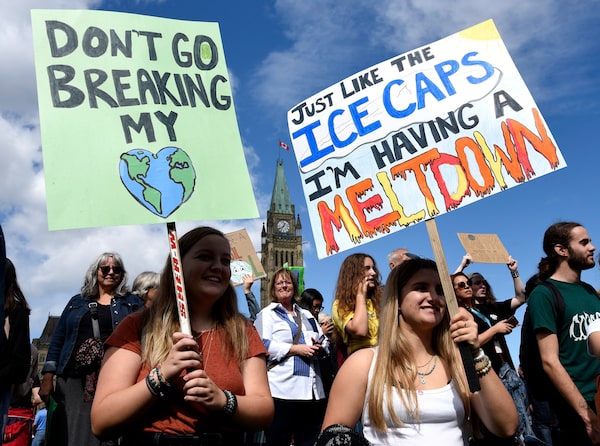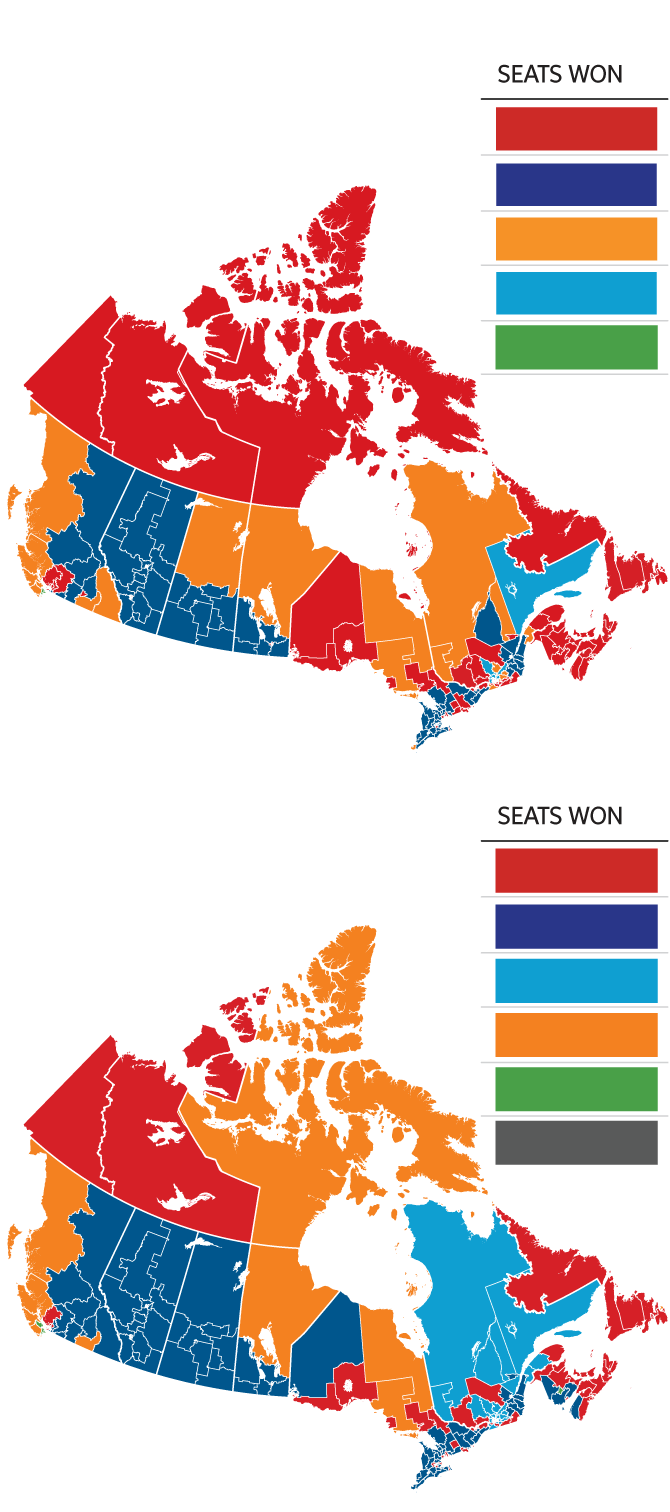Dave Chan/DAVE CHAN / THE GLOBE AND MAIL
The basics
- Conservative Leader Andrew Scheer has resigned, sources told The Globe and Mail Thursday as he held a special caucus meeting to announce his exit. It has reignited questions about who will lead the party, which had disappointing results in the October federal race, into its next electoral contest against Justin Trudeau’s Liberals.
- A week earlier, the new minority Parliament reopened with a call for unity in the Throne Speech, which emphasized the need to work together on “ambitious, but necessary” emissions-reduction goals, tax cuts and reconciliation with Indigenous people. Mr. Scheer wasn’t impressed by the speech, saying Mr. Trudeau “has divided this country” and and that it was an “insult” to Alberta and Saskatchewan, provinces that elected no Liberals in October’s election and gave all but one seat to the Conservatives.
- Mr. Trudeau’s new, larger cabinet was sworn in last month, elevating Chrystia Freeland to Deputy Prime Minister and Intergovernmental Affairs Minister. Here’s a full list of the new 36-member cabinet, the breakdown by region and gender and comparisons with past governments’ cabinets.
What is minority government?
Video primer: Here's what you need to know about the nuances of governing in a minority.
The Globe and Mail
To hold power, a government needs the confidence of the House of Commons, which means being able to marshal the most votes for key legislation from the ruling party’s MPs or from allied parties. If one party has more than half the seats – which, in this 338-seat Parliament, is 170 – that’s easy. That’s a majority government. Most federal governments have been majorities because the first-past-the-post electoral system puts smaller parties at a disadvantage.
But if the leading party has fewer than half the seats, as the Liberals do now (they have 157), that’s a minority government, also called a hung Parliament. Opposition parties can defeat a minority by:
- Holding and passing a vote of no confidence, an explicit statement that the parties don’t have faith in the government
- Defeating a Throne Speech, budget or other confidence question
If the government falls, a new election is triggered. The last time that happened federally was in 2011, when the Liberals, NDP and Bloc supported a motion finding Stephen Harper’s minority Conservatives in contempt of Parliament for not releasing budget-related documents. But that happened three years after the previous election, when the parties’ campaign war chests had been replenished and the main opposition party had chosen a new leader.
April 13, 2011: Leaders Jack Layton of the NDP, Gilles Duceppe of the Bloc, Stephen Harper of the Conservatives and Michael Ignatieff of the Liberals shake hands before an election debate.Sean Kilpatrick/The Canadian Press
One way to prevent the collapse of a minority Parliament is coalition government, in which two or more parties who can hold majority status together make a formal power-sharing deal. Those are rare in Canada: The last time it happened federally was during the First World War, and the rise of the Bloc Québécois in the 1990s made the idea of coalitions seem politically toxic. B.C. currently has a minority government, but it’s not a coalition: The provincial NDP and Greens describe it as an NDP government supported by the Greens, not an NDP-Green coalition.
How could this government fall?
Mr. Trudeau and NDP Leader Jagmeet Singh shake hands after the Oct. 10 French-language leaders' debate in Gatineau, Que.Adrian Wyld/Pool via REUTERS
None of the parties has a good reason to trigger an election soon, which would anger voters and could produce a result essentially the same as what we have now. “Everybody will make this work for at least two years," University of Moncton political scientist Donald Savoie told The Globe and Mail.
Even if Mr. Trudeau is challenged, his minority is a strong one, and he has better options to survive a confidence vote than the opposition parties have to defeat him. The Liberals could pass a confidence test with support from either the Bloc (who have 32 seats) or the NDP (24 seats). In theory, this means the Liberals could govern without seeking Bloc support, avoiding the unusual sight of a son of Pierre Trudeau joining forces with separatists.
But to topple the government, Andrew Scheer’s Conservatives, who have 121 seats, would have to reach impossibly far across the political spectrum, and any victory scenario would require both the Bloc and NDP. A Tory-Bloc-NDP alliance would have 177 seats, but if, for instance, it were Liberals-NDP versus Conservatives-Bloc, it would be 181 to 153. Liberals-Bloc versus Conservatives-NDP would be 189 to 145; again, a loss for Mr. Scheer. (The Greens and the lone Independent could affect the margin of victory in any of these scenarios, but they don’t have enough votes to change the outcome.)

SCENARIOS IN CONFIDENCE VOTE
LIB
CON
BQ
170 seats
for majority
NDP
GRN
216
LIB + BQ + NDP + GRN
213
LIB + BQ + NDP
189
LIB + BQ
181
LIB + NDP
180
CON + NDP + BQ + GRN
177
CON + NDP + BQ
153
CON + BQ
145
CON + NDP

SCENARIOS IN CONFIDENCE VOTE
LIB
CON
BQ
170 seats
for majority
NDP
GRN
216
LIB + BQ + NDP + GRN
213
LIB + BQ + NDP
189
LIB + BQ
181
LIB + NDP
180
CON + NDP + BQ + GRN
177
CON + NDP + BQ
153
CON + BQ
145
CON + NDP

SCENARIOS IN CONFIDENCE VOTE
170 seats
for majority
LIB
CON
BQ
NDP
GRN
216
LIB + BQ + NDP + GRN
213
LIB + BQ + NDP
189
LIB + BQ
181
LIB + NDP
180
CON + NDP + BQ + GRN
177
CON + NDP + BQ
153
CON + BQ
145
CON + NDP
Key people to watch
In minority Parliaments, certain roles become more crucial than usual in ensuring the smooth operation of government. Mr. Trudeau has created a few new roles, or recreated old ones, for the unique challenges of this Parliament. These include:

Deputy Prime Minister Chrystia Freeland.Patrick Semansky/The Associated Press/The Associated Press
Deputy Prime Minister: Mr. Trudeau’s predecessor, Stephen Harper, got rid of this post in 2006, but Mr. Trudeau brought it back and gave it to his former foreign affairs minister, Chrystia Freeland. The Alberta-born Toronto MP has long been one of Mr. Trudeau’s most trusted lieutenants, and now that status is more official. She’s also the Intergovernmental Affairs Minister, meaning she’ll be the one dealing with thorny provincial politics outside and inside the House.
House Leader Pablo Rodriguez with Mr. Trudeau.Blair Gable/Reuters/Reuters
House Leaders: Each party has their own expert in parliamentary procedure who is effectively a diplomat to the other parties, negotiating over legislation and, in the governing party’s case, making sure bills are passed. For the Liberals, that’s Pablo Rodriguez, who is also the party’s Quebec lieutenant. The team reporting to Mr. Rodriguez includes the party whip, who make sure MPs vote the way the leader expects them to. The other party House Leaders include Candice Bergen of the Conservatives, Peter Julian of the NDP and Alain Therrien of the Bloc.
Ontario MP Anthony Rota is dragged to the Speaker's chair by Mr. Trudeau and Conservative Leader Andrew Scheer.Patrick Doyle/Reuters
Speaker: The moderator of House debates, the Speaker’s job is to lay out the day’s agenda, allow MPs time to speak and arbitrate whether amendments meet the proper parliamentary procedures. To stay impartial, they never argue in debates themselves, and only vote in case of ties. When Parliament first returned, MPs chose Northern Ontario Liberal Anthony Rota for the job. He promised to help set a positive tone in the minority Parliament and hold more small, informal gatherings across party lines.
The parties’ pledges to co-operate (or not)
Liberals: In the days after the election, Mr. Trudeau said he wouldn’t form any coalition, formal or otherwise. He has met one-on-one with the other party leaders to discuss policy areas where they might find common ground.
NDP: When it comes to potential arrangements to support the Liberals, the NDP Leader said in October that “everything is on the table." But he also stressed that Mr. Trudeau has to understand he’s in a minority Parliament now and will have to work with the other parties to succeed.
Conservatives: Mr. Scheer, whose party secured a slightly larger share of the overall popular vote, doubled down in the months after election day on accusations that the Liberals don’t deserve to govern. But he also faced growing dissent within the party about whether he should continue leading it. On Dec. 12, The Globe reported that he had decided to step down. It is unclear when the Conservatives, who were due to have a convention in April, 2020, will decide on the new leadership.

Bloc Leader Yves-Francois Blanchet.Ryan Remiorz/The Canadian Press
Bloc: Leader Yves-François Blanchet, whose party surged to third place in the House, says his priority is to speak for Quebec on issues like the environment, immigration and taxation. He says he’s not in Ottawa to promote separatism or to trigger another election so soon after the last one, but will instead support or oppose government legislation on a case-by-case basis.
Greens: Leader Elizabeth May says that unless the Liberals raise their targets for reducing greenhouse-gas emissions, they shouldn’t count on support from the Greens on any issue. That’s not a threat she can easily enforce: Green Party rules forbid whipped votes, meaning the other two Green MPs, Paul Manly and Jenica Atwin, could vote differently than Ms. May does without fear of expulsion from the party. In any event, the Greens will be getting a new leader soon: Ms. May resigned on Nov. 4, though she remains the Greens’ parliamentary leader. The party, now led by Halifax candidate Jo-Ann Roberts, will choose a new leader at a convention in Prince Edward Island next October.
Independent candidate Jody Wilson-Raybould.Jimmy Jeong/The Canadian Press
Independent: Jody Wilson-Raybould, a former star cabinet minister ousted from the Liberals for her public stand on the SNC-Lavalin affair, is the lone Independent in the House. Without the infrastructure, staff and funding that MPs have in larger parties, it’s unclear what influence she could have. She has said that, despite past friction between her and the Liberals, she’s still a progressive and is willing to support them on a variety of issues.

Ottawa, Sept. 27: People rally on Parliament Hill as part of a global climate strike.Justin Tang/The Canadian Press
Points of contention
Pipelines: All parties except the Conservatives are in favour of keeping the Liberals’ carbon-pricing framework, but the bigger climate-change-related issue is what to do about oil pipelines. Last year, Mr. Trudeau’s government bought the Trans Mountain pipeline system for $4.5-billion to make sure an expansion is built that would ship even more Alberta crude to the B.C. coast. Mr. Trudeau says the Liberals plan to go ahead with it “as soon as possible,” but the NDP and Greens opposed it during the election campaign, arguing that exporting more oil is the wrong thing for Canada to do in a global climate crisis. The Conservatives also want to build Trans Mountain. Mr. Blanchet opposes pipelines on Quebec’s soil, such as the national energy corridor Mr. Scheer proposed to build if the Conservatives were elected, but he’s said he won’t bring the government down over Trans Mountain because it’s Western Canada’s problem, not Quebec’s.
Prairie ire: Except for one NDP seat in Edmonton, the Conservatives locked down every riding in Alberta and Saskatchewan by positioning themselves as champions of the oil and gas sector. Alberta and Saskatchewan’s premiers noticed, and warned Mr. Trudeau after election day that western alienation is a force to be reckoned with. In the House, expect to see drama about westerners’ energy- and economy-related grievances. In the Liberal caucus, Ms. Freeland (the Alberta-born Intergovernmental Affairs Minister) and Jim Carr (a Manitoba MP given a special assignment as representative to the Prairies) will play important parts in Mr. Trudeau’s efforts to make peace with Western Canada.
Quebec: Last year, Quebec passed a controversial law barring most public servants from wearing religious symbols like turbans or face veils, a law that civil-rights groups are challenging in court as discriminatory on racial and religious grounds. None of the federalist party leaders promised that Ottawa would support the challenge, but Mr. Trudeau was the only one to leave the door open to future intervention. Mr. Blanchet has said he won’t let that happen, and all parties’ rhetoric on the religious-symbols law will be closely watched by the Bloc and by Quebeckers.
More reading on the election results

ELECTION RESULTS 2015 VS. 2019
2015 FEDERAL
ELECTION RESULTS
SEATS WON
184
LIB
99
CON
44
NDP
10
BLOC
1
GREEN
2019 FEDERAL
ELECTION RESULTS
As of 6:30 a.m. ET
SEATS WON
157
LIB
121
CON
32
BLOC
24
NDP
3
GREEN
1
OTHERS

ELECTION RESULTS 2015 VS. 2019
2015 FEDERAL ELECTION RESULTS
SEATS WON
184
LIB
99
CON
44
NDP
10
BLOC
1
GREEN
2019 FEDERAL ELECTION RESULTS
As of 6:30 a.m. ET
SEATS WON
157
LIB
121
CON
32
BLOC
24
NDP
3
GREEN
1
OTHERS

ELECTION RESULTS 2015 VS. 2019
SEATS WON
2015 FEDERAL ELECTION RESULTS
184
LIB
99
CON
44
NDP
10
BLOC
1
GREEN
SEATS WON
2019 FEDERAL ELECTION RESULTS
As of 6:30 a.m. ET
157
LIB
121
CON
32
BLOC
24
NDP
3
GREEN
1
OTHERS
Voter turnout: Enthusiasm that brought Trudeau to power in 2015 has dimmed
Race and gender: Limited gains for diverse candidates prompt calls for changes to nomination process
B.C.: The key Liberal wins and losses on the West Coast
Prairies: Conservative sweep of illustrates deep well of resentment facing Trudeau
Ontario: Liberals maintain hold on key ridings in vote-rich GTA
Atlantic Canada: Liberals slip a bit but win strongly as Green Party makes breakthrough
Commentary and analysis
Konrad Yakabuski: As Canada’s new Foreign Affairs Minister, can Champagne fix what Freeland broke?
Campbell Clark: Trudeau will work with any party, as long as it’s on his terms
Lori Turnbull: Canada isn’t polarized – only our party system is
Lawrence Martin: In Canada, disunity comes with the territory
Gary Mason: The new government’s first priority? Look West
Watch: Chief political writer Campbell Clark looks at some of the friends Justin Trudeau will have to make to advance his agenda.
Compiled by Globe staff
With reports from Bill Curry, Marieke Walsh, Kristy Kirkup, Daniel Leblanc, Kathryn Blaze Baum, Tu Thanh Ha, James Keller, Nancy Macdonald, Ian Bailey, Justine Hunter, Andrea Woo and Evan Annett